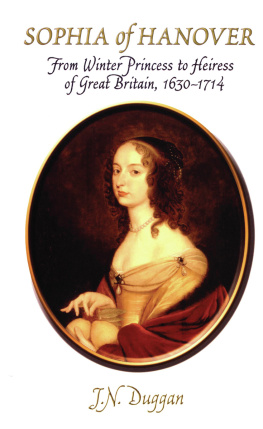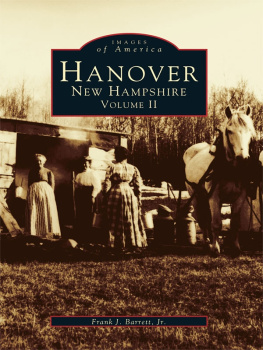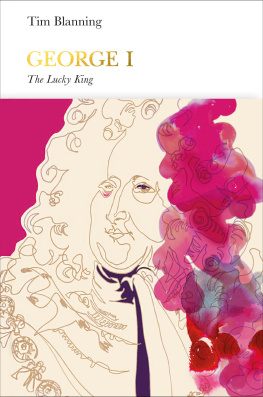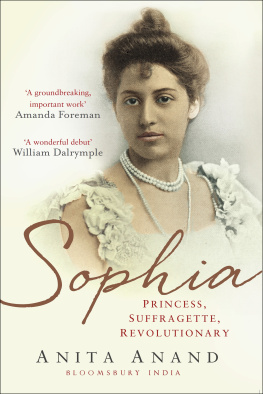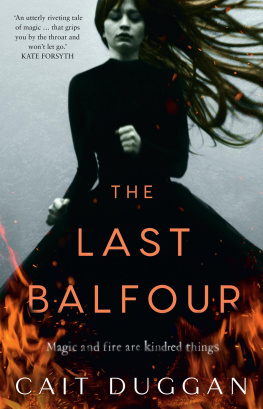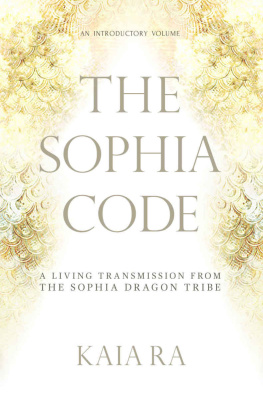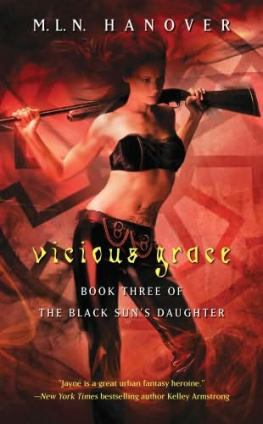SOPHIA OF HANOVER
Sophia, Electress of Hanover (16301714), granddaughter of James I of England and mother of George I , is best remembered in the English-speaking world as the connection between the Houses of Stuart and Hanover, and she would have succeeded Anne as Queen of England had she lived long enough. This new biography, however, reveals how Sophia daughter of Frederick and Elizabeth of the Palatinate, known as the Winter King and Queen of Bohemia was much more than a crucial link in the lineage of the English throne. Her memoirs, which she wrote at the age of fifty, and her correspondence, which dates from 1658 until the time of her death extensively quoted for the first time here reveal a gifted and prolific chronicler of her times. These offer readers a fascinating insiders view of life for the top echelons of society in the seventeenth and eighteenth centuries at The Hague, where she spent her childhood, the Castle of Heidelberg, where her brother ruled as Elector of the Palatinate, and the Leine Schloss in Hanover, and of politics, intrigue and daily life in the royal houses of Western Europe, to many of which she was related by blood or marriage.
Sophia spoke English, French, German, Dutch and Italian fluently and was remarkably open-minded, sophisticated and intellectually curious. Her writings cover an astonishing variety of subjects: from politics, religion and philosophy to international gossip and household tips, as well as intimate details of the lives of her illustrious family. J.N. Duggan, who has long been fascinated by Sophia, has translated a considerable proportion of the princesss memoir from the German as well as a number of letters to paint a remarkable portrait of a remarkable woman.
J.N. DUGGAN was born in Sheffield, England, in 1938 but raised in Ireland, returning to Sheffield to train as a nurse. She later completed a B.Sc. at University College Dublin. She worked in a hospital laboratory until her marriage, after which she devoted herself to children, husband, dogs, gardening, crosswords and reading, in that order. She now lives in Galway. www.booksbyjnduggan.com
To Tony, who opened so many doors for me
ACKNOWLEDGEMENTS
First of all I have to thank my family: Fursey, Sorcha, Oscar and Malachy for putting their various expertises at my disposal and for their encouragement and interest, in spite of not sharing their mothers obsession with the monarchy! Also thanks to my grandson Tadhg just for being there. I hope he will be proud of his granny.
Thanks, too, to Anna White, who suggested that I should write a book; to Nuala Smith for help and encouragement that went far beyond the call of friendship; to Dorothy Brown and her late husband, Garland Gill, for their hospitality in Edinburgh and their constant interest; and to my friends the Kiltoom Ladies who, for more years than any of us would like to admit to, listened to the unfolding of Sophias story.
Among others whose help is greatly appreciated are the staff of the county library in Athlone who went out of their way to procure the volumes of Sophias letters and spent many hours photocopying them without complaint; Dr Cordula Politis of St Andrews University, who translated the more important of the German letters; Carrie Budds, who very kindly dealt with my German correspondence, and Sheila Walker and Wally Braun, who were my intermediaries in Germany.
A special thanks to my agent Ita ODriscoll who has acted as a buffer between me and the harsh realities of the publishing world, to Peter Owen for liking my book and to my editor, James Ryan. I am also very grateful to Patsy Dale, who read the proofs with extraordinary care and attention; to Nick Pearson, who went to great lengths to satisfy all my whims picture-wise; and to Antonia Owen, who kept the whole enterprise together.
I cant finish without mentioning Mother Marguerite of the Convent of the Sacred Heart of Mary in Waterford who taught me English, let me loose on the school library, told me to finish the book and died too soon to see it published. And, lastly, I am grateful to my English Protestant mother and my Irish Catholic father, who made my sisters and me aware from a very early age that there are at least two sides to any question, and also for having reared us in a home that was always full of books.
CONTENTS
Hail Bishop Valentine, whose day this is,
All the air is thy diocese,
And all the chirping choristers
And other birds are thy parishioners,
Thou marriest every year
The lyric lark, and the grave whispering dove,
The sparrow that neglects his life for love,
The household bird, with the red stomacher,
Thou makst the blackbird speed as soon,
As doth the goldfinch, or the halcyon;
The husband cock looks out, and straight is sped,
And meets his wife, which brings her feather bed.
This day more cheerfully than ever shine,
This day, which might enflame thyself, old Valentine.
Till now, thou warmedst with multiplying loves
Two larks, two sparrows, or two doves,
All that is nothing unto this,
For thou this day couplest two phoenixes,
Thou makst a taper see
What the sun never saw, and what the Ark
(Which was of fowls, and beasts, the cage, and park,)
Did not contain, one bed contains, through thee,
Two phoenixes, whose joined breasts
Are unto one another mutual nests,
Where motion kindles such fires, as shall give
Young phoenixes, and yet the old shall live.
Whose love and courage never shall decline,
But make the whole year through, thy day, O Valentine.
From John Donne, An Epithalamion, or Marriage Song on the Lady Elizabeth and Count Palatine being Married on St Valentines Day
INTRODUCTION
If Sophia is remembered at all nowadays it is as a granddaughter of James I of England and VI of Scotland, a sister of Rupert of the Rhine or the mother of George I , but she was an exceptional woman in her own right, remarkable both for her open-minded and down-to-earth character and for her writings, which have been sadly neglected. It is high time for her to emerge from the shadow of her illustrious forebears, her tempestuous siblings and her numerous progeny to be appreciated for her own worth. It is to be hoped that this biography will allow her to do that.
She was a gifted and prolific writer. Professor Dirk van der Cruysse, who edited a modern edition of her memoirs in 1990, places her alongside Madame de Svign and the Cardinal de Retz as a chronicler of the royal and princely courts of the seventeenth century. The letters date from the time of her marriage in 1658 until her death in 1714, and the memoirs were written in 1680 when she was fifty. A large number of the letters were carefully preserved, and at the end of the nineteenth and the beginning of the twentieth century they were edited and published in Germany. She might have become a household name, but the events of 1914 made any German connection anathema to the English-speaking world and she was quietly forgotten.
Because she was related by blood or marriage to many of the ruling houses of Europe, for most of her life she occupied a ringside seat at the cockpit of continental politics and gives us an insiders view of many of the main military and political events of her time. War and dynastic marriages were the chief instruments used to bring about change, and Sophia took a lively interest in both, though she abhorred the former and mostly approved of the latter, unless they came too near home!
Apart from matters of state she gives us a wonderful glimpse of life as it was for the ruling classes of her time. We would find it very inconvenient and uncomfortable. She paints a picture of freezing castles and smoking chimneys at home; rickety carriages and muddy roads when travelling and, harshest of all, the demands of etiquette, which kept her standing for over an hour listening to her brother, the Elector, while she was in labour with her fourth son.
Next page
